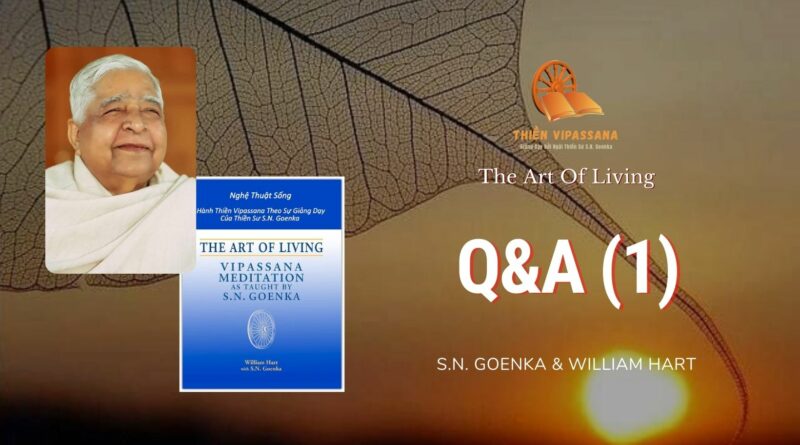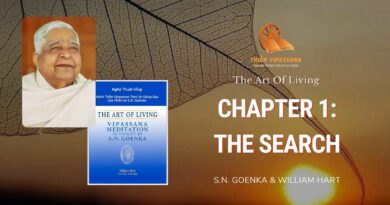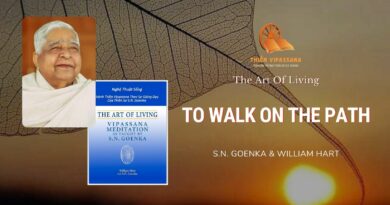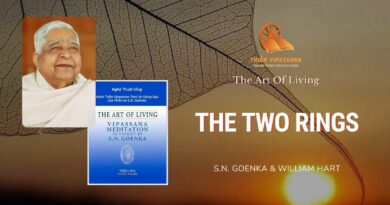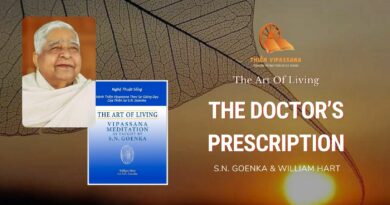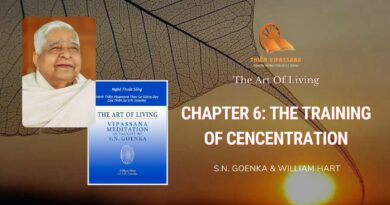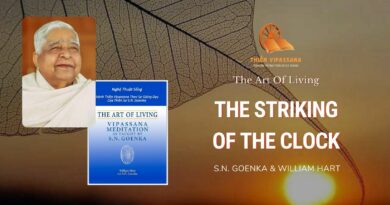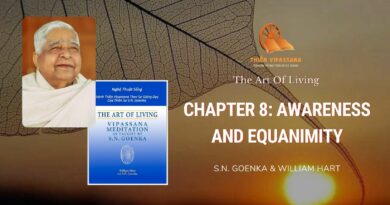Questions and Answers
QUESTION: You keep referring to the Buddha. Are you teaching Buddhism?
S.N. GOENKA: I am not concerned with “isms.” I teach Dhamma, that is, what the Buddha taught. He never taught any “ism” or sectarian doctrine. He taught something from which people of every background can benefit: an art of living. Remaining in ignorance is harmful for everyone; developing wisdom is good for everyone. So anyone can practise this technique and find benefit. A Christian will become a good Christian, a Jew will become a good Jew, a Muslim will become a good Muslim, a Hindu will become a good Hindu, a Buddhist will become a good Buddhist. One must become a good human being; otherwise one can never be a good Christian, a good Jew, a good Muslim, a good Hindu, a good Buddhist. How to become a good human being—that is most important.
You talk about conditioning. Isn’t this training really a kind of conditioning of the mind, even if a positive one?
On the contrary, it is a process of de-conditioning. Instead of imposing anything on the mind, it automatically removes unwholesome qualities so that only wholesome, positive ones remain. By eliminating negativities, it uncovers the positivity which is the basic nature of a pure mind.
But over a period of time, to sit in a particular posture and direct the attention in a certain way is a form of conditioning.
If you do it as a game or mechanical ritual, then yes—you condition the mind. But that is a misuse of Vipassana. When it is practised correctly, it enables you to experience truth directly, for yourself. And from this experience, naturally understanding develops, which destroys all previous conditioning.
Isn’t it selfish to forget about the world and just to sit and meditate all day?
It would be if this were an end in itself, but it is a means to an end that is not at all selfish: a healthy mind. When your body is sick, you enter a hospital to recover health. You don’t go there for your whole life, but simply to regain health, which you will then use in ordinary life. In the same way you come to a meditation course to gain mental health, which you will then use in ordinary life for your good and for the good of others.
To remain happy and peaceful even when confronted by the suffering of others—isn’t that sheer insensitivity?
Being sensitive to the suffering of others does not mean that you must become sad yourself. Instead you should remain calm and balanced, so that you can act to alleviate their suffering. If you also become sad, you increase the unhappiness around you; you do not help others, you do not help yourself.
Why don’t we live in a state of peace?
Because wisdom is lacking. A life without wisdom is a life of illusion, which is a state of agitation, of misery. Our first responsibility is to live a healthy, harmonious life, good for ourselves and for all others. To do so, we must learn to use our faculty of self-observation, truth-observation.
Why is it necessary to join a ten-day course to learn the technique?
Well, if you could come for longer that would be better still! But ten days is the minimum time in which it is possible to grasp the outlines of the technique.
Why must we remain within the course site for the ten days?
Because you are here to perform an operation on your mind. An operation must be done in a hospital, in an operating theatre protected from contamination. Here within the boundaries of the course, you can perform the operation without being disturbed by any outside influence. When the course is over the operation has ended, and you are ready once again to face the world.
Does this technique heal the physical body?
Yes, as a by-product. Many psychosomatic diseases naturally disappear when mental tensions are dissolved. If the mind is agitated, physical diseases are bound to develop. When the mind becomes calm and pure, automatically they will go away. But if you take the curing of a physical disease as your goal instead of the purification of your mind, you achieve neither one nor the other. I have found that people who join a course with the aim of curing a physical illness have their attention fixed only on their disease throughout the course: “Today, is it better? No, not better . . . Today, is it improving? No, not improving!” All the ten days they waste in this way. But if the intention is simply to purify the mind, then many diseases automatically go away as a result of meditation.
What would you say is the purpose of life?
To come out of misery. A human being has the wonderful ability to go deep inside, observe reality, and come out of suffering. Not to use this ability is to waste one’s life. Use it to live a really healthy, happy life!
You speak of being overpowered by negativity. How about being overpowered by positivity, for example, by love?
What you call “positivity” is the real nature of the mind. When the mind is free of conditioning, it is always full of love—pure love— and you feel peaceful and happy. If you remove the negativity, then positivity remains, purity remains. Let the entire world be overwhelmed by this positivity!
Bài viết này được trích từ cuốn sách The Art Of Living – Thiền Sư S.N.Goenka và William Hart.

